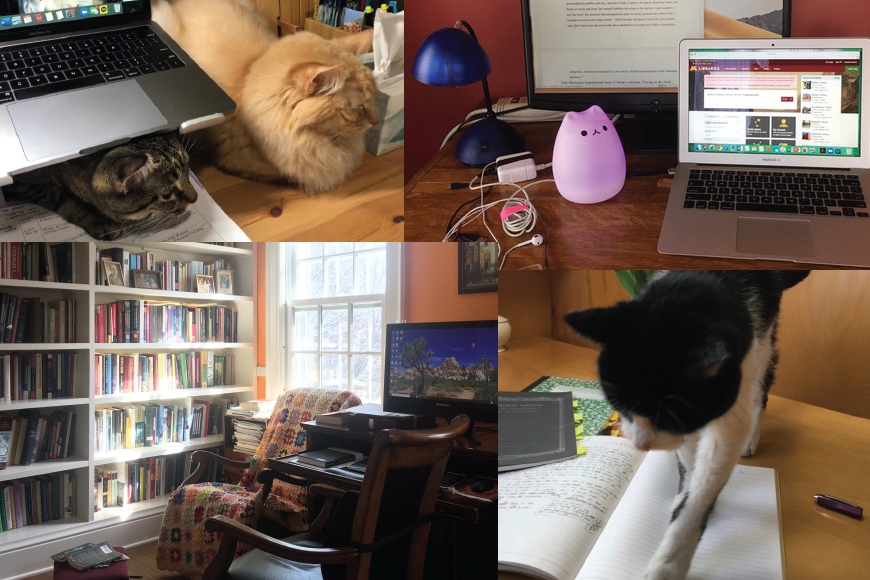Students and Faculty Adapt to Online Learning
When the COVID-19 pandemic forced the University to close campus in mid-March, English faculty and instructors were asked to refashion their courses online, with few days’ notice. Many instructors shifted course material in light of both real-world events and technological challenges; students had to suddenly learn how to contribute to class discussions on Zoom, email, and/or a shared document. By the end of spring semester, faculty and students had together fashioned a "new normal," one that is providing a base for evaluation to strengthen and enhance future online instruction.
We checked in with students about their experiences near semester’s end. “I'm very thankful for the amazing professors and classmates I have,” said graduating senior Lauren Swee. “I really do look forward to our Zoom calls, and getting to see their faces and hear their voices.”
Other students agreed that seeing peers and professors regularly was a highlight during Minnesota’s extended stay at home order. “All of my professors have been really great about communicating with us,” said Hannah Haakenson. “I didn’t know about Zoom before my classes went online, but that has also been a great resource for having group video calls with friends.”
Of course, there were challenges, as English major Katt Lee pointed out: “Due to the COVID-19 shutdown, I moved back home, so now I have many more responsibilities to carry out.” In addition, Lee said that she had herself experienced the anti-Asian American behavior related to the pandemic that has been reported in the national and local press: “It has been tough.” She did get used to webcamming in her classes. “I have a deepened respect for teachers willing to work with students,” she said, “for how they've responded to this pandemic.”
More student voices
As for our faculty, they consulted with the college’s technology unit and with each other to find the methods that worked best for online student interaction in their classes and workshops. Professor John Watkins said he was thrilled with his students’ engagement. He was teaching the perhaps too on-point course “The End of the World in Literature and History” this spring. “The class has always ended with several weeks on pandemics, Black Death through 1918 to the latest zombie novels,” he noted. “You can imagine what it was like this semester. I ended up adding some optional meetings just to talk about the current horror in light of that long history. The thing that hit us all was that awful sense that we have been here before. If you have never read Defoe's Journal of the Plague Year, it’s all there: people ignoring quarantine, constant fear of infection, worries about food supply, constantly changing medical recommendations, you name it.
“I really enjoyed teaching the course online,” he continues. “Shy students seemed to have an easier time speaking up online than in a crowded lecture hall. It was fantastic.”
Students came back for more: English “B-term” and summer courses, all online, had waitlists; more sections and courses were added, which also filled. English professors and instructors are utilizing these summer months to review their spring experiences and to prepare more fully for possible online or hybrid instruction in the fall. “We are lucky that the college has provided strong support for our online instruction," says English Chair Andrew Elfenbein, "and we are excited to be able to offer so many outstanding courses in this format.”
Even internships went remote in the spring, and students continued to gain essential job experience. Graduating senior Sara Donlin was one of two English majors in an ongoing two-semester internship at the University of Minnesota Press. “I’ve still been able to do my internship at home,” Donlin said, “from ordering complimentary copies of a book to be sent to architectural organizations around the world (I utilized my German skills!) to a marketing project for the Press’ spring publications. I’m glad that the U and the Press have been flexible in accommodating students during these times.”
As for senior Geoffrey Ayers, he too found comfort in interacting with peers in his classes. “What has helped inspire me to keep on keeping on is talking with other students. Everybody has their own story, and right now is the best time to listen.”
Added Swee: “The English department is filled with so many lovely, funny, and caring individuals.” They just happen to be appearing on screens.



